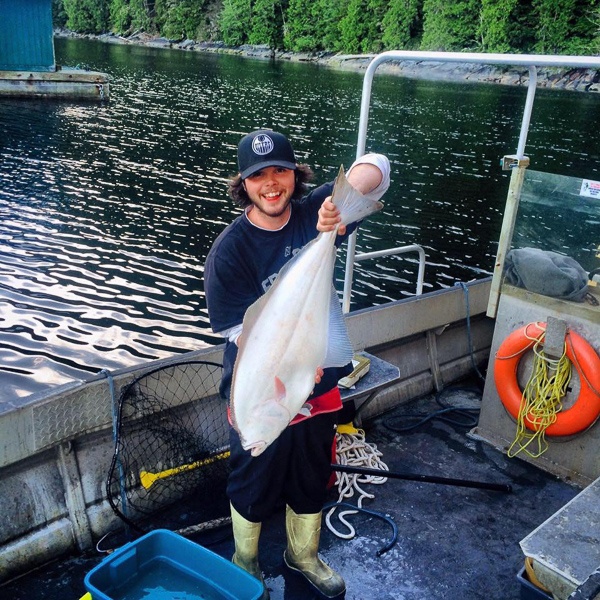Aquaculture Ambassador: Brad Rempel
By Samantha McLeod
SeaWestNews
“Now, as an adult, I get to represent one of the best companies I could work for, and doing some amazing things within the industry,” Brad Rempel, Council of Emerging Leaders in Aquaculture.
Aquaculture in Canada today generates $5.16 billion in economic activity and employs over 25,000 people. As one of the fastest growing food sectors in the world, the industry in Canada has a younger-than-average domestic workforce with two-thirds of all employees under the age of 35. Our new series, Aquaculture Ambassador, is about 14 Canadians who have come together to showcase the growing presence of young people in the sustainable future of farming the oceans. In this segment, we talk to Brad Rempel, Farm Technician, MOWI.
Tell us a little bit about yourself?
I grew up on Vancouver Island sharing time between Quadra Island and Vancouver Island. In my younger years, I took part in soccer and lacrosse and after my graduation I moved to Quadra Island full-time.
I have always loved the outdoors and working with natural resources. I was introduced to the aquaculture sector when I worked for Walcan Seafood Ltd. I spent two and a half years there on the docks and in the plants.
After Walcan Seafood Ltd., I went on to my next adventure for the next three years working in the Oil and Gas industry in Grande Prairie. There I worked with drilling fluids, and I got my foot in the power engineering path. Due to the oil market crash and complete shutdown of most major drilling sites I was laid off and had the choice between returning to the island to start something new, or risk and attempt to stay in Alberta and rely on the market turning around.
I chose to come home and begin pursuing an old pathway that I enjoyed so much in the past, the aquaculture industry. I now work for MOWI Canada in the Broughton Archipelago area and have been with the company for three and a half years.
I love being home again, on my days off in the summer I like exploring more of our backyard via 4x4ing and hiking, and in the winter time I enjoy going on more adventures on the island mountains.
What drew you to aquaculture?
As a child, I was invited to go out to a salmon farm around Quadra Island and see what it was all about. What stood out for me upon leaving the farm was recalling the thought I had to myself: “Wow I really loved the fact that once their day was done, they get to live on the ocean, enjoy the wildlife and fishing after the day is done, and they have satellite TV!”. I thought it was the coolest job in the world.
Now, as an adult, I get to represent one of the best companies you could work for and doing some amazing things within the industry.
What’s your average day in aquaculture like?
As a company, we are constantly doing projects and various tasks throughout the day. No singular day is the same as the next. An average day consists of feeding fish, pulling the LPD’s, and loading the feed. Depending on conditions, you could also be playing with the diffuser systems trying to achieve a CFM that helps the fish reach maximum comfortability. Keeping our fish happy and satisfied is our number one priority on the farms. Not only are we growing a healthy and sustainable product, we care for the fish like they’re family. My favourite times and projects with the fish are entries and harvesting. You gain a sense of fulfillment and joy with raising a new crop of fish to care for, from spawning to full grown.
How do you plan to change the current narrative about aquaculture, in particular salmon farming in Canada, from conflict to conversations about sustainability?
I would like to take initiative in communicating with any, and every individual that wants to have a civilized conversation about salmon farming.
Salmon farming is something I am very passionate about and I love to share my knowledge with people. For instance, I was on a flight back home from Ottawa recently and I was sitting next to two strangers. I got to chatting with one of the guys beside me and told him the pros to salmon farming and why we should be looking to aquaculture more to take the pressure off the wild stocks. He argued a few points and commonly-believed fallacies, but by sharing my knowledge and experience in the industry he was intrigued and agreed with me that aquaculture and salmon farming is an important part of, not only the ecosystem, but the way of the future of feeding people across the world as is projected to be 9 billion strong by 2040. So yeah, I plan to interact with and educate the people I meet daily. The council is working on various projects right now and it will be exciting to share what we come up with.
What is the single biggest project you are working on now?
The biggest project I am working on right now is finding the largest thing affecting the youth in this industry and giving them a voice to be heard. I would like to compile a series of concerns by talking to several young professionals that I have the pleasure of working with, and that are currently within the company. We are the voice and the next generation of up-and-comers in the industry. We are the next managers, the next executives. I am honored to be a part of this council and have a voice for myself, and I would like for all of my colleagues to have a voice of their own too.
RELATED LINKS:
Aquaculture Ambassador: Kenny Leslie
Aquaculture Ambassador: Wesley Chase
Aquaculture Ambassador: Jenny Weitzman
